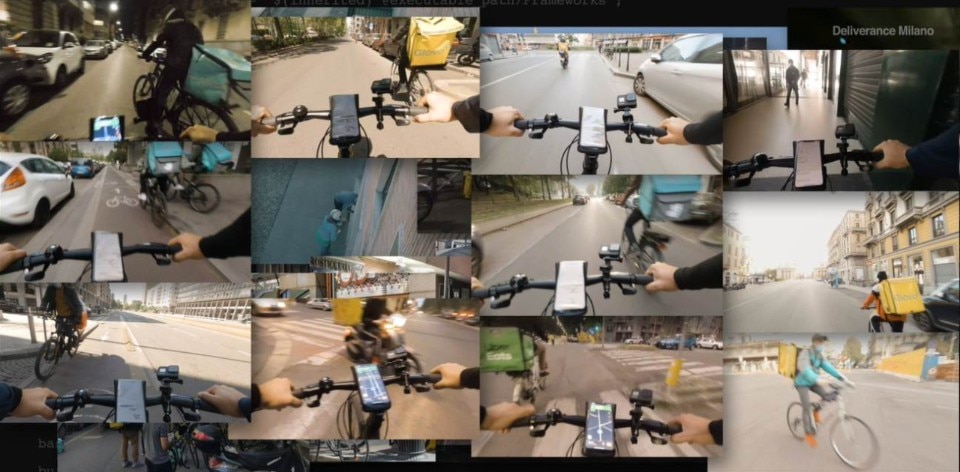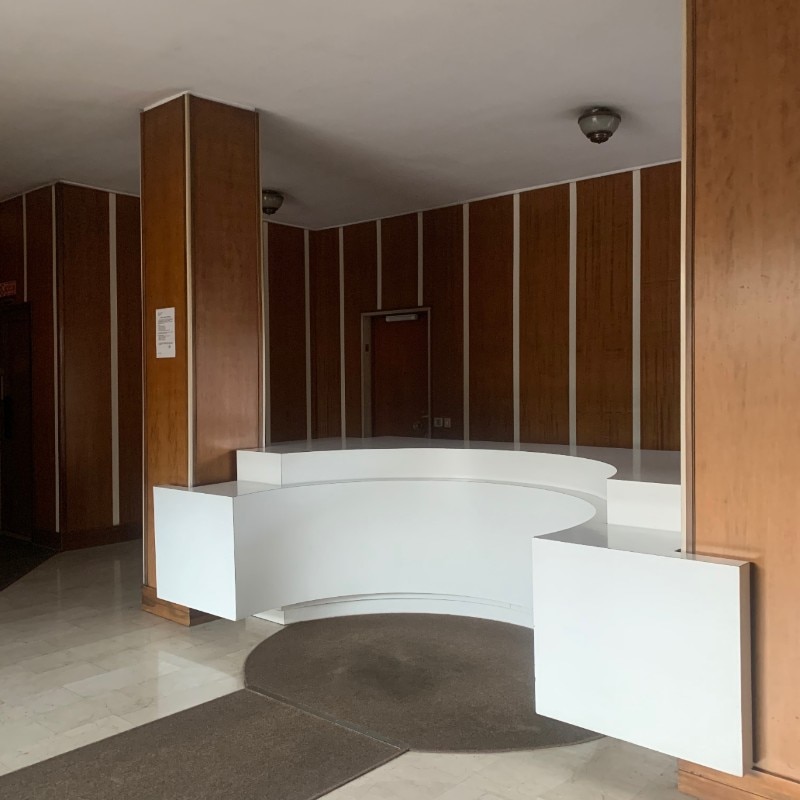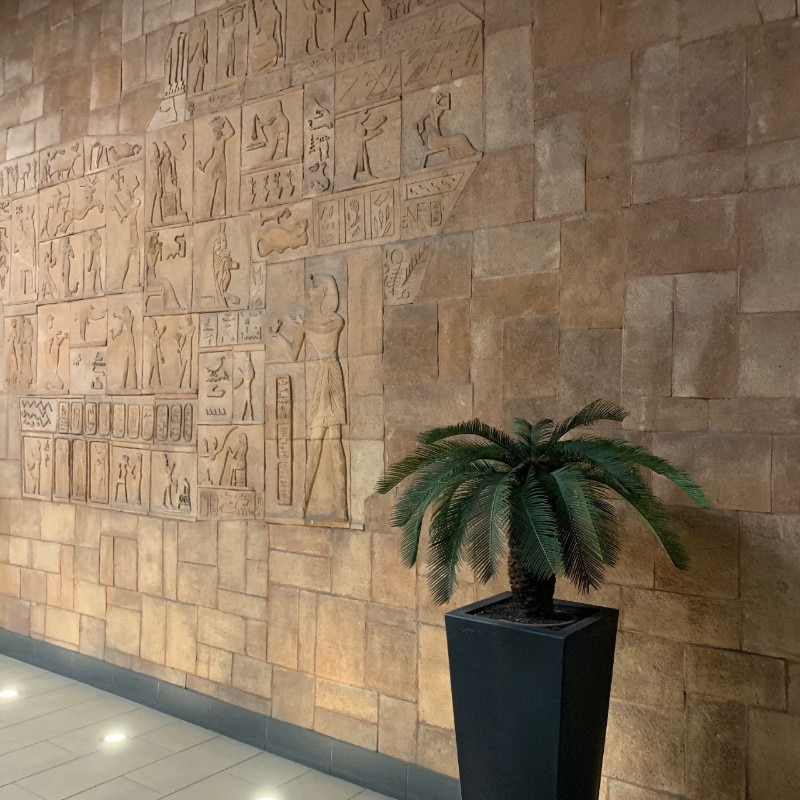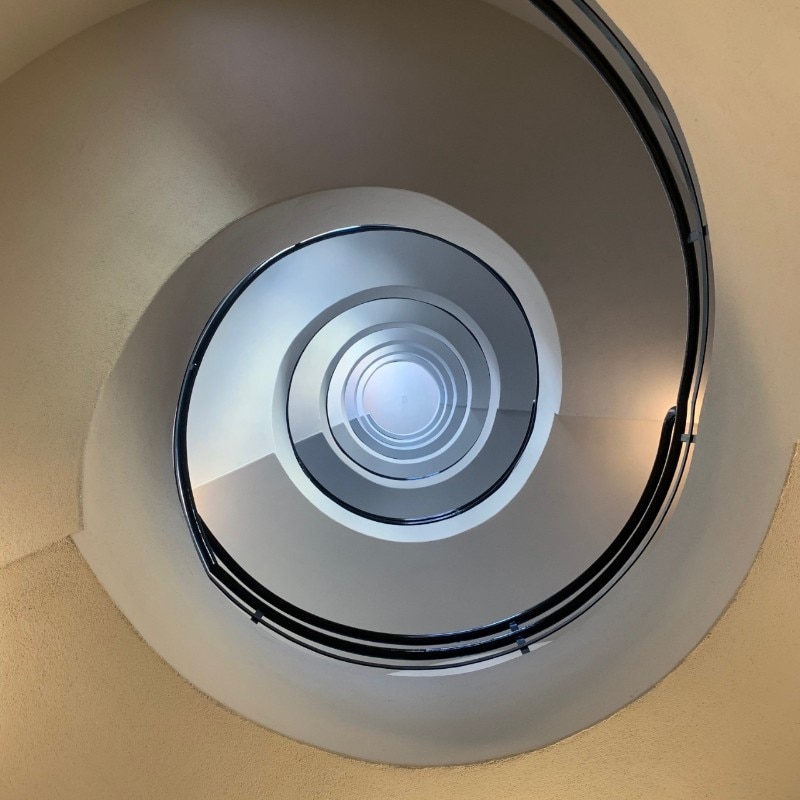This article was originally published at the end of August 2020, in the summer that followed the first lockdown in Italy. While it remains current, it should therefore be contextualized in that period.
For quite some years now, delivery riders – these silent figures that run across the city carrying huge thermal backpacks with the logos of the big companies for which they mainly deliver meals to our homes – have been the protagonists of the ghost metropolis during the lockdown. Described as the lockdown heroes by the media, delivery riders are above all the deuteragonists of the new urban precariat, an exposed and very fragile category of workers at the intersection between the platform capitalism, migrations, gig-economy and, indeed, the open spaces of the global pandemic. It's happening all over the world and it's happening in Milan where, at the end of May, the court placed the Italian branch of Uber Eats in temporary receivership for gangmastering.
A documentary of about fifteen minutes called Riders Not Heroes and produced by 2050+ and -orama captures the essence of the working conditions and life of the delivery riders in the Italian city during the pandemic, also through the voice of rider and artist Lupo Borgonovo, and his first-person look of a desert city filmed by three GoPros. Delivery is the title of his personal project, which consists of photos taken inside the buildings where he made the deliveries, divided into categories that were spontaneously created, “a way to build a single architecture made up of fragments of different interiors”. You'll find a little preview of it in the gallery below.
The video essay is the first chapter of a project created before and during the lockdown, through a creative dialogue on Zoom that also characterized the language of the video essay, a desktop movie which is built by accumulation : “Delivery riders are a conundrum of tensions and urgencies. Through them, we can tell the critical moment we are currently experiencing“, says the founder of 2050+, Ippolito Pestellini Laparelli. “They are the meeting point between the two parts of society that emerged during the lockdown: those who were locked inside their home and those who, out of necessity, were forced to leave their homes because they had to to go to work”. Two categories, says Pestellini Laparelli, that are “opposite but also connected through the interface of a mobile phone”.
Did we really need a lockdown in order for us to notice the existence of delivery riders?
On the one hand, in most parts of the world, the coronavirus lockdown made us acknowledge the phenomenon of delivery riders ‘by subtraction’, because they were among the very few categories still moving on the streets; on the other hand, it led to an exponential increase of riders due to the increase in demand from those who were stuck inside their homes. This is true for Milan as well as for other cities. The documentary was shot in Milan because this is where we spent our lockdown.
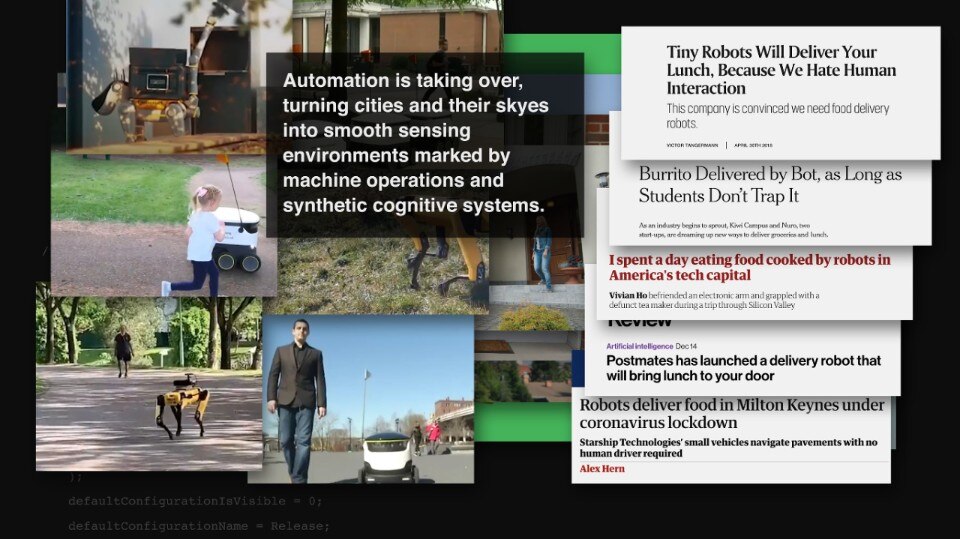
In the near future, rider delivery could be replaced by drone delivery, which is something you also mentioned at the end of the video.
This is a possible and perhaps inevitable evolution, but for which there is still a long way to go. It's a transition that not only depends on technology, but also on urban space, the way it was conceived and how it evolved. Consolidated European cities developed over centuries, around the presence and actions of humans. They will have to be rethought in terms of new forms of mobility and automation both on the ground and in the air, and human-machine coexistence will have to be renegotiated. In this first phase, hybrid models will continue to be tested, and drones and humans will alternate in the delivery services.
When it comes to their rights, riders are already being treated more like machines than human beings.
A few months ago, Benjamin Bratton wrote that during the coronavirus lockdown, the "chains of automation" emerged as a new public space that allowed us to maintain our social structure intact. This is a powerful but dangerous statement. We should always remember that, at the end of those chains, there are real people.
Riders represent at most one of the new frontiers of work, of digital precariat. They are perhaps the most obvious and striking case of exploitation of the so-called ‘platform capitalism’. The struggle for their rights is moving in a new and uncontrolled terrain, but this is a crucial match, because it allows us to measure the encounter/clash between two models, the twentieth century one and the future-oriented one, the rights of new working categories on the one hand, and the way digital platforms can be regulated on the other hand.
Can we draw a parallel between the boom of cycle paths in metropolises around the world and that of cycle delivery services?
I don't have much data about this, but I think that this parallel makes sense. It is an environmental transformation of the way urban mobility is conceived, that goes beyond the use of fossil fuels and traditional means of transportation. The new logistics 4.0 is generally moving in this direction. Amazon has been working on the “last mile” for quite some time now, experimenting with the use of drones, electric vehicles or bicycle-cargoes during the very last delivery stretch. We will have to rethink the whole road system, taking space away from cars to give it to light and sustainable vehicles, and to increase collective green spaces. Milan seems to be moving in this direction but there is still a long way to go.
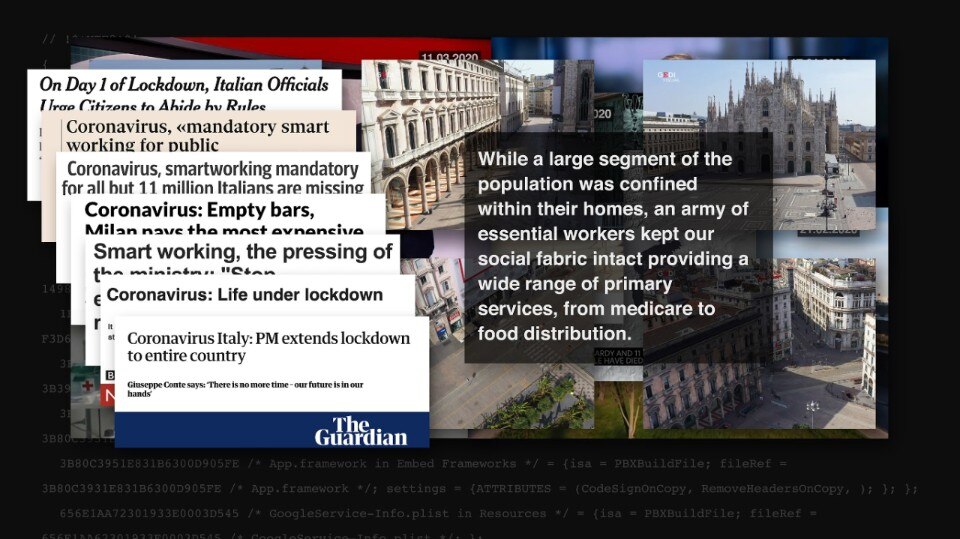
Fined, forbidden to bring their bike on the train, underpaid. Politics doesn't like riders. Do you think cities should instead protect them? How?
First things first, let’s talk about the spaces. While waiting for politics to come to their rescue, cities should offer riders safe bike paths, dedicated bike shops, places where they can rest, where they can leave their bikes at the end of the delivery rounds, maybe shelters where they can spend the night safely. Riders - like many essential workers – have played a crucial role in the past months. While thinking of the future, cities like Milan could recognize this fact.
And then, there are cities that have simply banned riders.
I don't think they should be banned. I think their work should be regulated, and their rights protected. Since the 2008 financial crisis, the rise of the gig-economy has allowed many people to get back on their feet and find a way to support themselves financially. The same is also true now. In our research, we interviewed a number of riders who were very frank about their need for this activity and its benefits – for some, it is the main or only source of income.
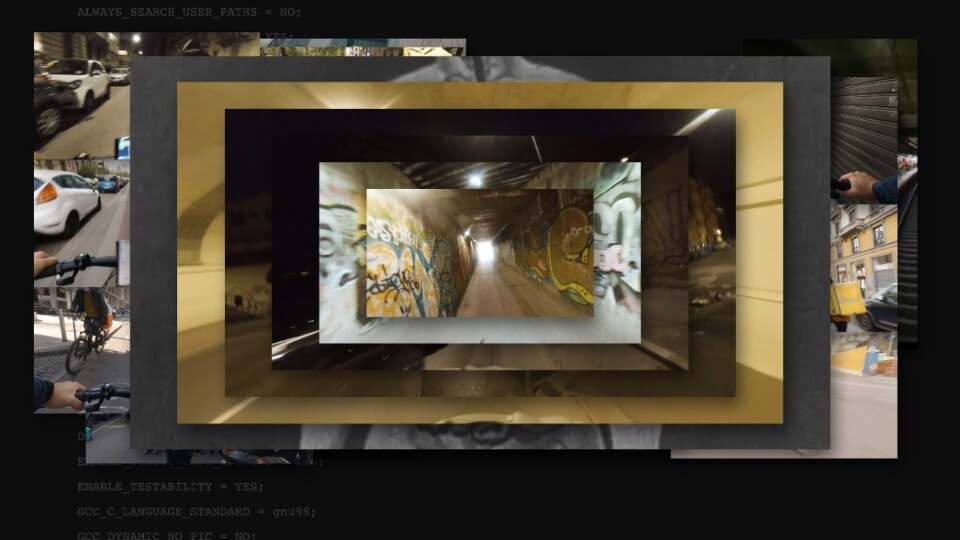
Author and activist Naomi Klein, in an article that had been talked about a lot during the pandemic, wrote about a dystopian world in which we are permanently at home, stuck in front of devices that already know what we want – food, Netflix and anything in-between – and we buy stuff without hardly ever getting up from the couch. Which is not very different from how we lived during the lockdown.
For years, we have been talking about the risks on our civil liberties of what is commonly called Surveillance Capitalism (another name for Platform Capitalism). The lockdown during the most critical months of the pandemic suddenly projected us into a dystopian but real scenario, with a fractured society between those who were stuck at home and those who were forced to continue working. In line with Naomi Klein, in an article published a few weeks ago on ArtForum, Paul Preciado describes the first “touchless subjects”, dominated by algorithmic intelligences that orient their choices and decisions, in an infinite feedback loop mechanism. Years ago, Evgeny Morozov was already talking about Algorithmic Regulation, as the closest form to a political program that the Silicon Valley Tech Giants could conceive. As most parts of our lives migrated on-line, this condition has become even more extreme, marking an enormous increase in value (and power) of the big-tech powers – Amazon in primis.
Before the pandemic, I had a conversation with Uber’s vice president Michael Gough, who told me how the company's ambition is to become the operating system of cities.
I think that Amazon, Siemens and many other platforms have similar ambitions. I do not agree with this idea, first of all because it’s coming from Uber, one of the most aggressive companies on the market: in recent years, it has also become one of the most criticized one because of its unfair competition and exploitation of workers. The operating system of cities must remain in the public interest and under public management, because it should protect the rights of citizens by improving the offer of services. Of course, this does not exclude collaborative models with private platforms. It is a matter of politics, of data sovereignty on the part of citizens, and of fair competition. The road taken by Francesca Bria in Barcelona and through the DECODE initiative has put people back at the centre of these processes, allowing citizens to decide how to share their data and to whom. This is a Data Commons project and has as its objective, on the one hand, the regulation of the work of large private platforms and, on the other, the collection of a collective intelligence of data for the establishment of public platforms, aimed at improving the offer of our cities.
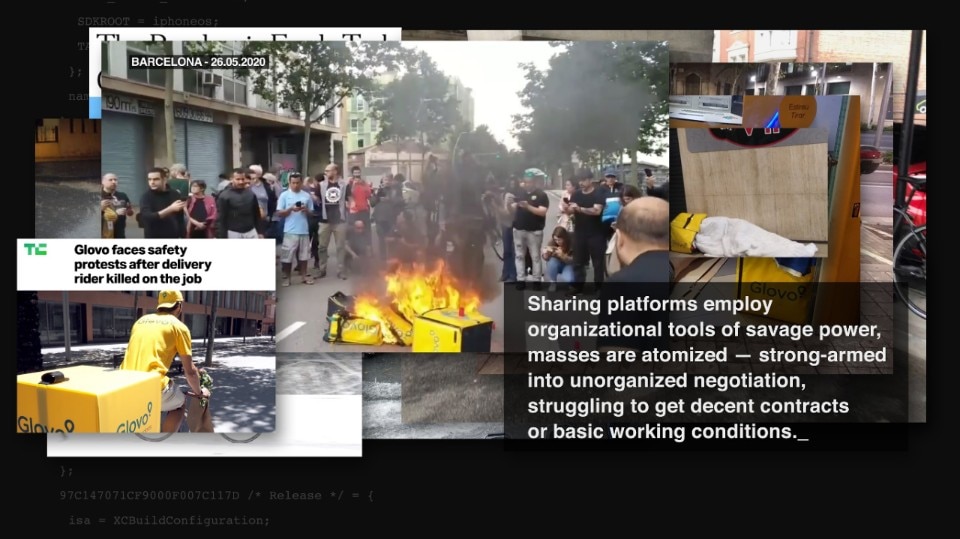
2050+ is a Milan-based interdisciplinary agency that works at the intersection of technology, environment, politics and architecture. Team: Ippolito Pestellini Laparelli, Mattia Inselvini, Erica Petrillo, Massimo Tenan.
-orama is a Milan-based creative studio operating in the fields of art, design, cinema and architecture. Team: Davide Rapp, Andrea Dal Martello, Giorgio De Marco




